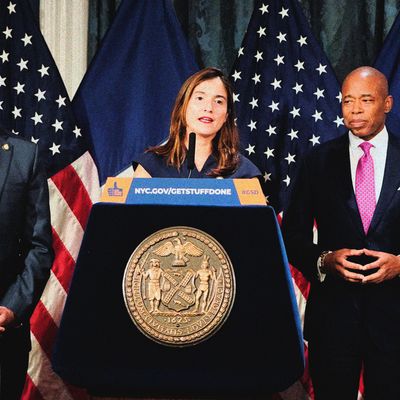
The surprising defeat of City Councilwoman Marjorie Velázquez in Tuesday’s elections is a loss that hurts all of New York, affecting people who have never visited the 13th District in the northeast Bronx. In a part of the city that usually votes Democratic, a first-time Republican candidate named Kristy Marmorato, an X-ray technician, pulled off the unlikely feat of dispatching an incumbent, winning 53 percent of the vote in a district with a nearly 62 percent Democratic enrollment.
The move that doomed Velázquez politically was her vote for last year’s rezoning of Bruckner Boulevard, a measure approved by a vote of the full council that will create a few hundred much-needed apartments in a city that is desperate for housing.
The proposal itself is a simple, sensible, and modest change in zoning to allow four buildings to go up, two of them eight stories high, at 2945 Bruckner Boulevard. Nearly half of the 350 apartments scheduled to be built will be rent stabilized with 99 set aside for seniors and 22 for veterans, along with a new supermarket and community meeting space.
In a healthy community, the idea of building a new supermarket and a place to live for seniors and veterans would get waved through with little fanfare. But in this low-density area of New York — which includes all or part of Throggs Neck, Allerton, Orchard Beach, City Island, and Pelham Parkway — a core of activists has spent decades trying to keep the community inhospitable to growth or change.
“This challenge doesn’t end with Bruckner,” one of the not-in-my-backyard activists told the local Bronx Times newspaper earlier this year. “It’s going to continue to be a virus that hits our community year after year, so our intention is to continue to fight any developer that wants to build buildings throughout this community.”
Only 58 units of affordable housing were built in the district from 2014 to 2021 in a city where the most recent Housing and Vacancy Survey found that virtually no apartments are available on the open market at New York’s median rent of $1,500 a month (the vacancy rate for such units is 0.9 percent).
“We’re not doing a needle-exchange program here,” a developer pleaded with NIMBY residents at one of several rowdy community meetings on the Bruckner rezoning. “We’re not doing a homeless shelter here. We’re not starting an antifa rally.”
It made no difference. A critical mass of enraged NIMBY activists filed a junk lawsuit (which was dismissed), threatened violence against supporters of the plan — including Velázquez — and ultimately put together enough votes to elect Kristy Marmorato the first Republican councilmember from the Bronx in 40 years.
Velázquez, who at first opposed the Bruckner rezoning, changed her mind after some prodding by civic voices including the Daily News editorial board, City Council Speaker Adrienne Adams, and Mayor Adams, who spoke at a rally in favor of the project. Before changing her position to support the project, Velázquez secured the backing of Labor Strong, an alliance of some of the city’s most powerful unions, including DC37, the Hotel Trades Council, SEIU 32BJ, and the District Council of Carpenters. Her commitment to guaranteeing union jobs on the project was so attractive to the building trades that Keith Elkins, political director of the carpenters union, told The City that “Jesus Christ could have come in for an interview and we’d still pick Marjorie.”
It’s unclear whether the unions and pro-development pols made good on promises to defend Velázquez against the expected NIMBY backlash. A day after the historic loss of the district, the chair of the Bronx Democratic Party, Senator Jamal Bailey, was spotted in Puerto Rico at the Somos El Futuro political conference.
As the smoke clears, the need for housing is more urgent than ever. “Let’s not discuss and dismiss the various voices that call me every day, like seniors, asking for housing and thanking me for that,” Velázquez said during a contentious televised debate with Marmorato. “Let’s not dismiss the voices of Black and brown [people] in my community who have been asking me for home-ownership opportunities.”
Velázquez did the right thing and paid a high price for it. When the new council convenes in January, the other 50 members of the council will be pressed to consider many more rezonings and other common-sense measures to address the city’s housing crisis. Their instinct will be to point to Velázquez’s loss and vote to limit development, even as record homelessness soars. That may turn out to be the worst outcome of the election in the unlucky 13th District.






























